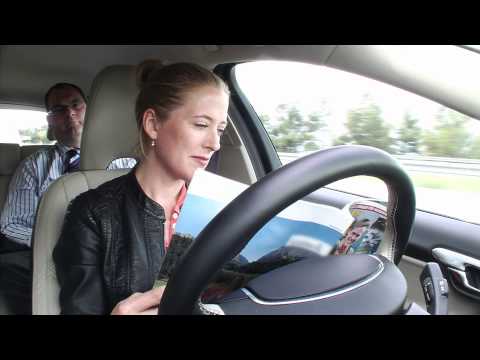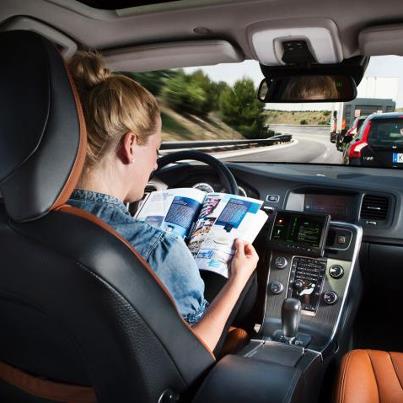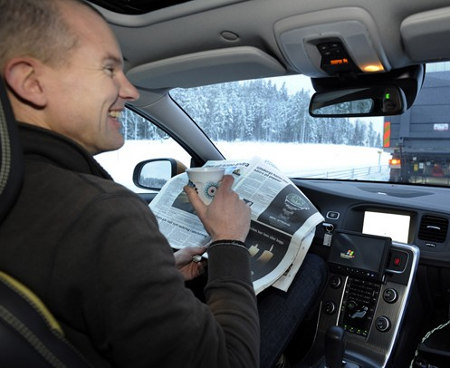|
|
|||||||||||||||||||||||||||||||
|
The Future of Self-Driving Cars and Auto Insurance
Imagine if in the future your auto-insurance was almost nothing? And better yet, you didn't even need a driver's license to own a car which takes you to and from work every day.
Well, that future isn't so far away. The Volvo Car Corporation is developing self-driving cars which cater to young consumers who are too addicted to tweeting, texting and updating Facebook to want to drive a car, much less purchase one. In recent years the percentage of people who prefer to take buses, subway or even bicycle to work has gone up, partially fuelled by high oil prices but also fuelled by cities seeing higher demand for public transit. Volvo says in the future passengers with electronic gadgets will enjoy "all the multi-tasking possibilities of public transportation behind the wheel of your own car." "Teenagers look at cars with different, less traditional eyes than we, their parents, do," says Volvo CEO Stefan Jacoby. "When we regard the driver's seat as a symbol for freedom and mobility, they see the only place where they can't be constantly connected. And many of them think that this constant connectivity is more important than having a driver's license and a car." Thus this explains why many teenagers and young adults have decided to stick to public transit or even bicycles. Thus having cars which are self-driving and autonomous cars, which can steer, accelerate and brake automatically, requiring very little human interaction, seems to be the future of cars... And also holds the potential for preventing car accidents by removing human error. Volvo isn't the only ones doing this however. Other companies are also working on developing self-driving tech, but the concept needs one company to spearhead the movement (just like Toyota spearheaded hybrid cars) before other automakers will invest big bucks in getting the technology to the local auto dealership. Volvo is even pre-emptively advertising this technology and in September 2012 issued photos of a woman behind the wheel reading a magazine and engaged in conversation with a passenger — clearly letting the car take control. Part of this might also because of China, where everyone wants a car, but the streets are so clogged with them (and many new drivers are inexperienced). Volvo, which is owned by Chinese automaker Geely, is positioning itself as a pioneer in autonomous driving and wants to eventually start mass producing self-driving Volvos made in China. Volvo's self-driving car push also comes at a time when federal safety regulators are pushing for rules to control the proliferation of technology in vehicles. Distracted driving has become a top concern for the U.S. Department of Transportation, topping even drunk driving or driving under the influence of drugs/heavy medication. Volvo has been testing autonomous driving that requires very little human interaction. Their goal to make driving so easy a kid could do it simply by pressing a button for school, arriving at school and pressing another button for home before getting out of the car. The end result would be cars which effectively would ferry people to and fro with very little interaction.
One such test Volvo did was the European SARTRE (Safe Road Trains for the Environment) project that had a lead truck followed by four vehicles driven autonomously at speeds of up to 55 mph — in some cases with no more than a 13-foot gap between the vehicles. "Our aim is to gain leadership in the field of autonomous driving by moving beyond concepts and pioneering technologies that will reach the customers," says Marcus Rothoff, Volvo's product attribute manager for driver assistance. Volvo says it sees a potential for zero accidents and injuries during autonomous driving because it's removing the human-error element. Really, if the technology is perfected, the only time there should be an accident is when a different car is being driven recklessly by a human. There is also a lot of confidence in the technology. According to a 2012 survey by J.D. Power, almost 50 percent of drivers aged 18-37 would definitely or probably buy a vehicle capable of fully autonomous driving. And once the technology hits auto dealerships we will see the percentages rise dramatically as people see how well the cars work. "Allowing the car to act automatically is crucial when moving toward the vision that future cars will not crash at all," says Rothoff. "Our present systems for auto braking, lane-keeping aid and adaptive cruise control could be described as the first steps towards autonomous driving. Now, we are moving towards technologies with a higher degree of autonomous driving in normal traffic situations." "Personally, I am convinced that the majority of tomorrow's car owners will not even dream of buying a car without autonomous driving possibilities," says Volvo CEO Stefan Jacoby.
What about the Environment?Environmental proponents like to point out that cars, even auto-driving cars, are bad for the environment. But what about hydrogen fuel cell self-driving cars? Which is, admittedly, what every major automaker is seeing in the future. Yes, on the way we will likely have gasoline-propelled self-driving cars, but it will be a necessary stepping stone. We have to realize that we will never get rid of cars. There are always going to be a need for cars for transporting both goods and people. Everything controlled by computers and GPS. What will be more interesting is when taxi companies start focusing on self-driving cars and eliminating taxi drivers completely. Which means, really, that self-driving taxis will become the norm and many people won't even bother with buying a car. They will just press a button on their SmartPhone, have a "SmartTaxi" arrive, get in the SmartTaxi, and then ride to wherever they need to go... and then the amount will be charged to their SmartTaxi account (sort of like a phone bill or internet bill). Less cars, more taxis = Good for the environment. And this could eliminate truck drivers entirely. Self-driving trucks could delivery goods from city to city without the need of a human behind the wheel. Begging the idea, it won't be the machines that rise up and start killing people as per the Terminator film franchise, it will be machines that start to replace the manual labour jobs and it will be a matter of economics. Which means some people will no doubt be upset that computers are effectively stealing the jobs from people. Are Auto Insurance Companies Ready for Self-Driving Cars?This is an interesting time for insurance companies and it is bound to get more interesting. Right now some companies are introducing "Pay As You Drive Insurance" or "Pay Per Mile Insurance". The idea being that people who drive less often, like only once or twice per month, should be able to get away with paying for less insurance because it isn't like they are driving 20 times per week. Some companies are also offering combined "house and auto and life insurance". Bundling of insurance services. And many companies are now trying to offer competitive rates by displaying online auto insurance quotes on a variety of websites. The idea being is that if people can compare insurance quotes online they can determine which insurance company is best for them, pay less and worry less about whether they are getting a good deal. But what about insurance for self-driving cars? Are they safer than regular cars? Insurance experts say yes, they're willing to take that step if that is the direction the market is going. With time we should see insurance rates drop dramatically in an effort to stay competitive as a lower percentage of accidents will mean insurers can offer lower rates and still be competitive and profitable. Car owners win because they don't have to pay as much for insurance and insurance companies win because they don't have to pay out for damaged vehicles as often.
Video Previews of Self Driving Cars
Below a video made by Volvo demonstrating a self-driving car.
|
|
||||||||||||||||||||||||||||||
|
Website Design + SEO by designSEO.ca ~ Owned + Edited by Suzanne MacNevin | |||||||||||||||||||||||||||||||


